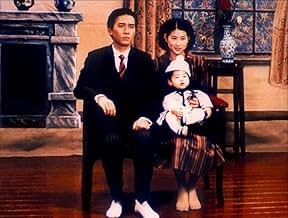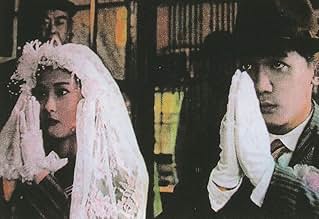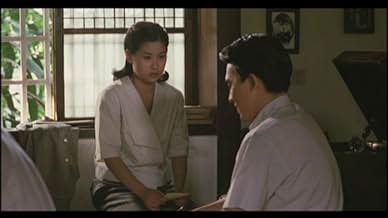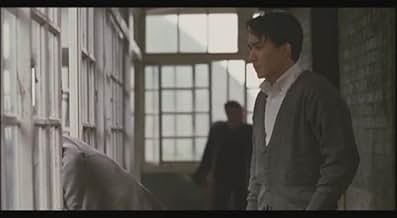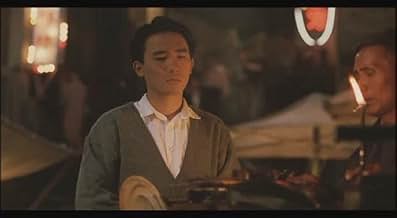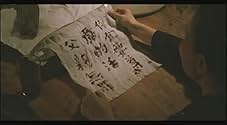NOTE IMDb
7,8/10
6,6 k
MA NOTE
L'histoire d'une famille mêlée à la "terreur blanche" que le gouvernement du Kuomintang a fait subir aux Taïwanais après leur arrivée de Chine continentale à la fin des années 1940.L'histoire d'une famille mêlée à la "terreur blanche" que le gouvernement du Kuomintang a fait subir aux Taïwanais après leur arrivée de Chine continentale à la fin des années 1940.L'histoire d'une famille mêlée à la "terreur blanche" que le gouvernement du Kuomintang a fait subir aux Taïwanais après leur arrivée de Chine continentale à la fin des années 1940.
- Réalisation
- Scénario
- Casting principal
- Récompenses
- 8 victoires et 6 nominations au total
Tony Leung Chiu-wai
- Wen-ching
- (as Tony Chiu Wai Leung)
Tien-Lu Li
- Ah-lu
- (as Tian-Lu Li)
Avis à la une
This is the only one of Hou Hsiao-hsien's films I caught at a retrospective of his work, and it's a tragedy because this film is so incredibly good. Hou's rigorous formal approach (highly geometrical framing, repetitive shots along axes, distinctive use of lived-in colors) provides a framework for the film to operate within its own world. Whereas Coppola's "Godfather" goes this way and that, without a significant coherence, visually or rhythmically, "City of Sadness" feels like an elegy to Taiwan and the family (in much the same way that "Underground" is an ode to what was once Yugoslavia). At times funny, sorrowful, and invigorating, I suppose that what makes this film so special is that it refuses to operate in "big moments" and focuses, like Ozu (who Hou is often compared to) on the little events that make life what it really is.
A movie beyond its cinematic presence, but matters also the director's outlook and the audience's interpretation - in plain words, you would give it a much higher rating if someone explains you it's historical context. Surprisingly, I find Tony Leung's performance in this film decent and slightly bland, maybe because his other works are simply too good, or maybe the performance of this movie across the board is all too flawless. As the eldest son myself, I specifically appreciated the character Wen-heung, a boisterous, truculent, and rugged man, yet also interestingly a child carer, a family adhesive, and a natural leader, whose unconstrained aggression engenders one's own tragedy. Regarding the movie itself, non-linear editing, picturesque sceneries, and long, still frames generate versatile atmospheres with a unique artistry. Also a historic fiction, the film gradually unravels an era of generational trauma using convoluted storylines and symbolic characters. In times of turmoil, perhaps it would be better if we are as deaf as Wen-ching or as bewildered as Wen-leung, like yielding grass that lives through scything gales. Definitely one of the most important chinese cinematic tribute worthy of deep-dive analyses and global recognition.
10cd1793
Needless to comment on Hou's excellent artistic directing, the story itself tightly revolves around an average Taiwanese family's life during the years 1945-1949 when Japanese occupation ended and KuoMinTang from mainland took over. There are conflict on personal/family level between native Taiwanese (BenShengRen) and mainland newcomers(WaiShengRen), and massive political prosecution and massacre of native intellectuals by KuoMinTang. Hou painted an inspiring (rather than sad) picture of the native intellectuals giving their lives to earn their fellow Taiwanese dignity which was ironically more lacking during the KuoMinTang ruling than Japanese ruling.
10kmevy
This film is definitely one of the best historical film i have ever seen!
... putting aside all those clichés most filmmakers are tend to use: there is no such thing as heroic portrayal of martyrs or the use of extremely artificial dramatic art. That makes this film believable and, compared to others, very unique.
Normally you would have a narrator who is telling you the story from his point of view. Now, i don't want to say that i dismiss this way of narration but "A city of sadness" does not need such a narrator; in fact it would shatter the special specific atmosphere of this movie if that would be the case. Without definitive narrative elements, the staging normally involves (narration/music/DP etc), the viewer gets the feeling that he is able to see for himself what the lives of those people were like when WWII ended. It is fascinating to witness how this very sober staging is still able to evoke strong emotions within the viewer. This is due to the directors vision but also to the cast which did an amazing job.
It was also very clever to have the deaf Wen-Ch'ing as the main character so the viewer can sympathize with him very easily: like Wen-Ch'ing the viewer is kind of caught up within the political turbulence and is not to able react like he would want because he is mute ... and is therefore not able to speak up in a loud voice to stop the violence. He is forced to watch.
Even today the topic Taiwan/China isn't solved at all. After watching this film people will surely get a better understanding why the struggle between China and Taiwan is so filled with anger, sadness, fury ...
so ... that's definitely a must-see!! ;)
... putting aside all those clichés most filmmakers are tend to use: there is no such thing as heroic portrayal of martyrs or the use of extremely artificial dramatic art. That makes this film believable and, compared to others, very unique.
Normally you would have a narrator who is telling you the story from his point of view. Now, i don't want to say that i dismiss this way of narration but "A city of sadness" does not need such a narrator; in fact it would shatter the special specific atmosphere of this movie if that would be the case. Without definitive narrative elements, the staging normally involves (narration/music/DP etc), the viewer gets the feeling that he is able to see for himself what the lives of those people were like when WWII ended. It is fascinating to witness how this very sober staging is still able to evoke strong emotions within the viewer. This is due to the directors vision but also to the cast which did an amazing job.
It was also very clever to have the deaf Wen-Ch'ing as the main character so the viewer can sympathize with him very easily: like Wen-Ch'ing the viewer is kind of caught up within the political turbulence and is not to able react like he would want because he is mute ... and is therefore not able to speak up in a loud voice to stop the violence. He is forced to watch.
Even today the topic Taiwan/China isn't solved at all. After watching this film people will surely get a better understanding why the struggle between China and Taiwan is so filled with anger, sadness, fury ...
so ... that's definitely a must-see!! ;)
A previous poster described this film as a Taiwanese Godfather, but better. Indeed, this film has a lot similarities to godfather, in which the most notable is the condensation of an entire nation into the life of one single family. Even though I never really come to love other Hou's films, City of Sadness is a flawless epic that truthfully depict an era that is forgotten by most of my generation. I have heard those stories from my paternal grandparents, who are like people portrait in the film, grass root Taiwanese. I have also heard stories from my maternal grandparents, who are the late comers from mainland China. The entire different perspectives surprised me that in such a small nation, mistrust is still profoundly rooted and transmitted via generations. City of Sadness portraits this image so hauntingly and yet with beautiful and quiet transcendence seeing the turmoil through the eyes of the deaf and mute son of the Lin family. Taiwan, the city of sadness, is eternally sorrowful because of its rootlessness, which until today, still runs in my blood.
Le saviez-vous
- AnecdotesIn 1989, Hou Hsiao-hsien's A City of Sadness, the first film to touch on the 228 Incident, a taboo subject in Taiwan, became a big hit in the theaters. As a result Jioufen, where the film was set, revived due to the film's popularity. The nostalgic scenery of Jioufen as seen in the film, as well as appearances in other media, charmed many people into visiting Jioufen. For the beginning of the 90s, Jioufen experienced a tourist boom that has shaped the town as a tourist attraction. Soon retro-Chinese style cafés, tea houses, and souvenir stores bearing the name "City of Sadness" were built.
- ConnexionsFeatured in When Cinema Reflects the Times: Hou Hsiao-Hsien and Edward Yang (1993)
Meilleurs choix
Connectez-vous pour évaluer et suivre la liste de favoris afin de recevoir des recommandations personnalisées
- How long is A City of Sadness?Alimenté par Alexa
Détails
Box-office
- Montant brut mondial
- 143 169 $US
Contribuer à cette page
Suggérer une modification ou ajouter du contenu manquant


